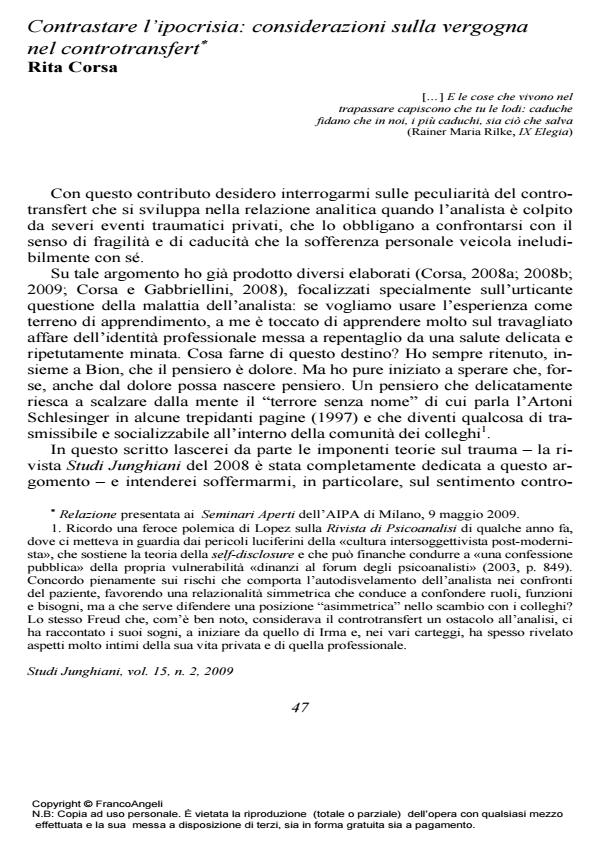Contrastare l’ipocrisia: considerazioni sulla vergogna nel controtransfert
Titolo Rivista STUDI JUNGHIANI
Autori/Curatori Rita Corsa
Anno di pubblicazione 2010 Fascicolo 2009/30
Lingua Italiano Numero pagine 23 P. 47-69 Dimensione file 555 KB
DOI 10.3280/JUN2009-030003
Il DOI è il codice a barre della proprietà intellettuale: per saperne di più
clicca qui
Qui sotto puoi vedere in anteprima la prima pagina di questo articolo.
Se questo articolo ti interessa, lo puoi acquistare (e scaricare in formato pdf) seguendo le facili indicazioni per acquistare il download credit. Acquista Download Credits per scaricare questo Articolo in formato PDF

FrancoAngeli è membro della Publishers International Linking Association, Inc (PILA)associazione indipendente e non profit per facilitare (attraverso i servizi tecnologici implementati da CrossRef.org) l’accesso degli studiosi ai contenuti digitali nelle pubblicazioni professionali e scientifiche
The Author examines the countertransference characteristics in the case of traumatic situations that strike the analyst, forcing to confront himself with the sense of life frailty and transience. The narcissistic axis risks suffering cracks and mutilations, that can heavily interfere with the therapeutic contract and with the relational field. This paper focuses on countertransference feeling of shame. This affect on one hand signals a distance breakdown between the Self and the other, but on the other it can have a structural value, preserving the analytical couple from insensibility and ambiguity fall. The recognition of countertransference envy and shame is a necessary passage to oppose the fatal attraction toward conventional hypocrisy (Freud, 1915), that menaces thought vitality. The A. proposes a clinical vignette to illustrate her ethical, conceptual and technical position about the peculiar countertransference problems of this situation.
Parole chiave:Vergogna, controtransfert, malattia dell’analista, vergogna dell’analista, ipocrisia convenzionale, ambiguità.
Rita Corsa, Contrastare l’ipocrisia: considerazioni sulla vergogna nel controtransfert in "STUDI JUNGHIANI" 30/2009, pp 47-69, DOI: 10.3280/JUN2009-030003